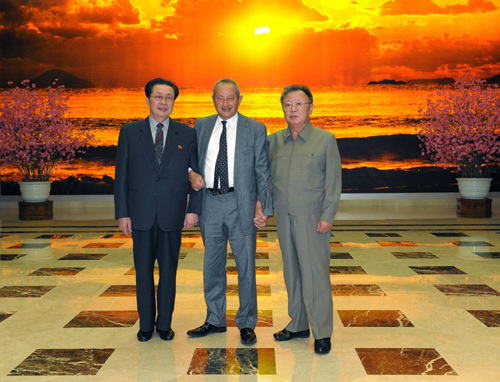Recent turmoil in Egypt has brought hope to many Egyptians of a better future. While many democratic states have praised these events, authoritarian governments such as Yemen and Saudi Arabia fear the consequences of similar uprisings. Although we should not expect North Korea to be happy with Mubarak’s demise, it remains possible that Pyongyang will continue to have positive relations with any new regime in Cairo. The history of the short yet cordial relationship between both states provides insights about its likely future course.
With its isolationist nature and a strong pro-ethnic Korean rhetoric, one might initially have thought that North Korea would have had little interest in forging ties within the Middle East. But during the Cold War, Pyongyang’s relationship with the region was based on a complex strategy of attempting to gain direct benefits while simultaneously weakening the South. North Korea’s “anti-imperialistic”, posture and its ties to the Soviet Union had interesting ramifications in the Middle East. The most famous example would be the DPRK’s arms sales to Iran during the Iran-Iraq War, when Teheran was believed to have spent almost 40% of its arms acquisition budget in 1982 on imports from North Korea. But prior to this, it was Nasser’s 1953 coup d’etat that paved the way for North Korea’s first forays into the region under Kim-Il Sung. This was thanks to the combination of Nasser’s charisma and the rise of ‘’socialism’’ and pan-Arabism in the Middle East at the time. Egypt, like many of its neighbors, was unwilling to merely become one of Moscow’s puppets. So with its Juche ideology and relatively independent stance towards the USSR, North Korea was an attractive ally. From Pyongyang’s perspective, the Middle East could not only provide benefits in trade and military exchange, but could also be used as a tool to alienate South Korea in the region. With its unique standing, Pyongyang invited Egyptian government officials, intellectuals and students to North Korea, while also establishing several bilateral agreements on trade and economic cooperation, mass media science and culture.
Recent turmoil in Egypt has brought hope to many Egyptians of a better future. While many democratic states have praised these events, authoritarian governments such as Yemen and Saudi Arabia fear the consequences of similar uprisings. Although we should not expect North Korea to be happy with Mubarak’s demise, it remains possible that Pyongyang will continue to have positive relations with any new regime in Cairo. The history of the short yet cordial relationship between both states provides insights about its likely future course.
With its isolationist nature and a strong pro-ethnic Korean rhetoric, one might initially have thought that North Korea would have had little interest in forging ties within the Middle East. But during the Cold War, Pyongyang’s relationship with the region was based on a complex strategy of attempting to gain direct benefits while simultaneously weakening the South. North Korea’s “anti-imperialistic”, posture and its ties to the Soviet Union had interesting ramifications in the Middle East. The most famous example would be the DPRK’s arms sales to Iran during the Iran-Iraq War, when Teheran was believed to have spent almost 40% of its arms acquisition budget in 1982 on imports from North Korea. But prior to this, it was Nasser’s 1953 coup d’etat that paved the way for North Korea’s first forays into the region under Kim-Il Sung. This was thanks to the combination of Nasser’s charisma and the rise of ‘’socialism’’ and pan-Arabism in the Middle East at the time. Egypt, like many of its neighbors, was unwilling to merely become one of Moscow’s puppets. So with its Juche ideology and relatively independent stance towards the USSR, North Korea was an attractive ally. From Pyongyang’s perspective, the Middle East could not only provide benefits in trade and military exchange, but could also be used as a tool to alienate South Korea in the region. With its unique standing, Pyongyang invited Egyptian government officials, intellectuals and students to North Korea, while also establishing several bilateral agreements on trade and economic cooperation, mass media science and culture.
Try unlimited access
Only $1 for four weeks
-
Unlimited access to all of NK News: reporting, investigations, analysis
-
Year-one discount if you continue past $1 trial period
-
The NK News Daily Update, an email newsletter to keep you in the loop
-
Searchable archive of all content, photo galleries, special columns
-
Contact NK News reporters with tips or requests for reporting
Get unlimited access to all NK News content, including original reporting, investigations, and analyses by our team of DPRK experts.
Subscribe
now
All major cards accepted. No commitments – you can cancel any time.










